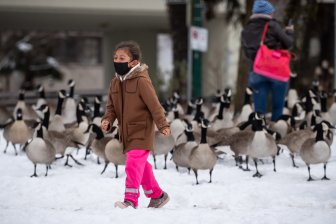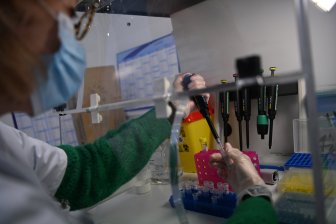Health
Parents urged to vaccinate children amid rising Omicron cases, says pediatrician – Global News
A pediatrician who has researched COVID-19 vaccine hesitancy among parents in Canada, the United States and Israel is urging people concerned about getting their children vaccinated to talk to a health-care provider as the Omicron variant pushes cases to all-time highs.
Dr. Ran Goldman, a professor in the department of pediatrics at the University of British Columbia, said the current national vaccination rate among children aged five to 11 is too low, so parents with questions about the safety of the vaccine should get them answered through a personal connection with a pediatrician, family doctor, nurse or pharmacist.
“If those health-care providers listen first and understand what is the basis for the hesitancy, and exactly what questions parents have, they can then address this with their knowledge and expertise. This is the key and the magic, the green card, to getting parents to understand and accept vaccines,” said Goldman, who practises in Vancouver.
Goldman said past campaigns involving pediatric vaccines have shown that conversations with health-care providers are meaningful and have helped to change hesitant parents’ minds.

Data from Health Canada shows 39 per cent of kids between the ages of five and 11 have received a first dose of the Pfizer-BioNTech vaccine, which the agency approved for that age group last November.
“It’s not enough,” Goldman said. “I know we are failing our children in terms of the rate of vaccination. It’s not only for the children that receive them, it’s protecting all in the environment around them, including their parents, their grandparents, sick or healthy, who need to go to work.”
British Columbia matches the national vaccination rate of 39 per cent, as does New Brunswick, while the lowest rates are in Alberta and Yukon, at 37 per cent, according to government data in those jurisdictions.
In Ontario, nearly 45 per cent of children up to age 11 have received their first dose while the highest vaccination rate, at 67 per cent, is in Newfoundland and Labrador.
Adrian Dix, the health minister in B.C., encouraged more parents to register their kids for a vaccine.
“It will make children safe and, of course, your family safer as well,” he said.
Goldman said parents should know that the consequences from infection are much higher than any possible side-effects.
He was lead author of a study published in the International Journal of Environmental Research and Public Health last October on the willingness of parents to get their children vaccinated against COVID-19.
The research involved a pair of surveys of a total of 2,800 parents in 12 emergency departments in the United States, Israel and Canada. Most of the parents, 54 per cent, were from Canada and surveyed in Vancouver, Saskatoon, Edmonton and Calgary.
The first survey, done during the peak of the pandemic between March and May 2020, showed nearly 65 per cent of parents said they would get their kids under age 12 vaccinated.
Those results were compared with a second survey between December 2020 and March 2021, after a vaccine for adults was approved.

However, less than 60 per cent of parents said they would be willing to have their children vaccinated.
“We were surprised,” Goldman said, adding some parents believed that getting vaccinated themselves was fine, but too risky for their kids.
“We need to work with parents to understand the importance and the safety of vaccines for children specifically,” he said.
Michelle McGrath of Langley, B.C., said she registered her five-year-old son Isaiah for a vaccine as soon as it was approved for use in children.
“It’s the most researched part of medicine and has the most stringent standards for safety,” she said of vaccines.
“For people who are saying we don’t know the long-term impact of the vaccine, we also don’t know the long-term impacts of contracting this virus,” she said.
McGrath said she’s also worried about the effect COVID-19 could have on her vulnerable 11-month-old twin boys, who were born three months premature and must be taken to regular medical appointments, where they could be exposed to the virus.
Goldman said about 90 per cent of kids will not get infected after they receive the vaccine, which uses one-third the dose formulated for older children and adults.
“Getting the illness and maybe having long COVID is much more risky than any kind of hypothetical, potential side-effects.”
Parents who believe the vaccine was developed too quickly should know that the technology for mRNA vaccines has existed for nearly 20 years, he said.
“We know the technology works and is actually safer than many other technologies for vaccines. The influenza vaccine is safe in about 50 per cent of people, and the COVID vaccine is effective in about 90 per cent of people.”
© 2022 The Canadian Press
Health
Interior Health delivers nearly 800K immunization doses in 2023
|
|
Interior Health says it delivered nearly 800,000 immunization doses last year — a number almost equal to the region’s population.
The released figure of 784,980 comes during National Immunization Awareness Week, which runs April 22-30.
The health care organization, which serves a large area of around 820,000, says it’s using the occasion to boost vaccine rates even though there may be post-pandemic vaccine fatigue.
“This is a very important initiative because it ensures that communicable diseases stay away from a region,” said Dr. Silvina Mema of Interior Health.
However, not all those doses were for COVID; the tally includes childhood immunizations plus immunizations for adults.
But IHA said immunizations are down from the height of the pandemic, when COVID vaccines were rolled out, though it seems to be on par with previous pre-pandemic years.
Interior Health says it’d like to see the overall immunization rate rise.
“Certainly there are some folks who have decided a vaccine is not for them. And they have their reasons,” said Jonathan Spence, manager of communicable disease prevention and control at Interior Health.
“I think there’s a lot of people who are hesitant, but that’s just simply because they have questions.
“And that’s actually part of what we’re celebrating this week is those public health nurses, those pharmacists, who can answer questions and answer questions with really good information around immunization.”
Mima echoed that sentiment.
“We take immunization very seriously. It’s a science-based program that has saved countless lives across the world and eliminated diseases that were before a threat and now we don’t see them anymore,” she said.
“So immunization is very important.”





Health
Remnants of bird flu virus found in pasteurized milk, FDA says


|
|
The U.S. Food and Drug Administration said Tuesday that samples of pasteurized milk had tested positive for remnants of the bird flu virus that has infected dairy cows.
The agency stressed that the material is inactivated and that the findings “do not represent actual virus that may be a risk to consumers.” Officials added that they’re continuing to study the issue.
“To date, we have seen nothing that would change our assessment that the commercial milk supply is safe,” the FDA said in a statement.
The announcement comes nearly a month after an avian influenza virus that has sickened millions of wild and commercial birds in recent years was detected in dairy cows in at least eight states. The Agriculture Department says 33 herds have been affected to date.
FDA officials didn’t indicate how many samples they tested or where they were obtained. The agency has been evaluating milk during processing and from grocery stores, officials said. Results of additional tests are expected in “the next few days to weeks.”
The PCR lab test the FDA used would have detected viral genetic material even after live virus was killed by pasteurization, or heat treatment, said Lee-Ann Jaykus, an emeritus food microbiologist and virologist at North Carolina State University
“There is no evidence to date that this is infectious virus and the FDA is following up on that,” Jaykus said.
Officials with the FDA and the USDA had previously said milk from affected cattle did not enter the commercial supply. Milk from sick animals is supposed to be diverted and destroyed. Federal regulations require milk that enters interstate commerce to be pasteurized.
Because the detection of the bird flu virus known as Type A H5N1 in dairy cattle is new and the situation is evolving, no studies on the effects of pasteurization on the virus have been completed, FDA officials said. But past research shows that pasteurization is “very likely” to inactivate heat-sensitive viruses like H5N1, the agency added.
Matt Herrick, a spokesman for the International Dairy Foods Association, said that time and temperature regulations for pasteurization ensure that the commercial U.S. milk supply is safe. Remnants of the virus “have zero impact on human health,” he wrote in an email.
Scientists confirmed the H5N1 virus in dairy cows in March after weeks of reports that cows in Texas were suffering from a mysterious malady. The cows were lethargic and saw a dramatic reduction in milk production. Although the H5N1 virus is lethal to commercial poultry, most infected cattle seem to recover within two weeks, experts said.
To date, two people in U.S. have been infected with bird flu. A Texas dairy worker who was in close contact with an infected cow recently developed a mild eye infection and has recovered. In 2022, a prison inmate in a work program caught it while killing infected birds at a Colorado poultry farm. His only symptom was fatigue, and he recovered.
___
The Associated Press Health and Science Department receives support from the Howard Hughes Medical Institute’s Science and Educational Media Group. The AP is solely responsible for all content.





Health
Canada Falling Short in Adult Vaccination Rates – VOCM


Canada is about where it should be when it comes to childhood vaccines, but for adult vaccinations it’s a different story.
Dr. Vivien Brown of Immunize Canada says the overall population should have rates of between 80 and 90 per cent for most vaccines, but that is not the case.
She says most children are in that range but not for adult vaccines and ultimately the most at-risk populations are not being reached.
She says the population is under immunized for conditions such as pneumonia, shingles, tetanus, and pertussis.
Brown wants people to talk with their family physician or pharmacist to see if they are up-to-date on vaccines, and to get caught up because many are “killer diseases.”
-



 Health2 hours ago
Health2 hours agoRemnants of bird flu virus found in pasteurized milk, FDA says
-
Art8 hours ago
Mayor's youth advisory council seeks submissions for art gala – SooToday
-



 Science16 hours ago
Science16 hours ago"Hi, It's Me": NASA's Voyager 1 Phones Home From 15 Billion Miles Away – NDTV
-
Art20 hours ago
Made Right Here: Woodworking art – CTV News Kitchener
-
News14 hours ago
Some Canadians will be digging out of 25+ cm of snow by Friday – The Weather Network
-
Real eState19 hours ago
Caution about Canada's private real estate sector abounds as valuations slow to adjust – The Globe and Mail
-



 Sports17 hours ago
Sports17 hours agoAuston Matthews turns it up with three-point night as Maple Leafs slay Bruins in Game 2 – Toronto Sun
-
Media13 hours ago
Jon Stewart Slams the Media for Coverage of Trump Trial – The New York Times







